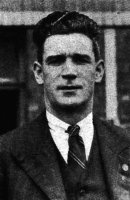dave halliday
Born in Dumfries, Halliday, like his predecessor Travers, enjoyed a long and varied career as a player and it was probably that factor which won him the job ahead of nearly 100 other hopefuls. His football career began in local schools soccer in the Dumfries area, where he featured on the left wing. Local League side Queen of the South picked him up when he was old enough but after a short spell with the "Doonhammers" he joined St Mirren where he featured in the reserve side at inside left. Later he was transferred to Dundee, and the move to Dens Park proved to be the making of Dave Halliday as a player. The Dark Blues converted Dave to a centre-forward and the Dens Parkers reaped the benefit to the tune of 100 goals in four seasons. Halliday's goal scoring exploits earned him a Scottish League cap against the English at Ibrox in 1924. Dave moved on from Dundee to Sunderland, and after a spell at Roker Park, was transferred to Arsenal for £6,500 in November 1929. The following year Halliday was on the move again, this time to Manchester City for a fee of £5,700.
Dave's first move into management happened in the mid-1930s when he took over non-league side Yeovil and Petters United as player manager. He was still with the West Country side when he applied for the vacant Aberdeen job in November 1938. Halliday took up his duties at Pittodrie early in the New Year of 1938 and he could have hardly picked a more inopportune time to move into management. Pat Travers had already begun to dismantle his superb mid-1930s Black & Gold side and had not finished rebuilding when he departed for Shawfield. As a result, Halliday's early days at Pittodrie were punctuated by new signings, many - like former Yeovil player Charlie Smith - from unfashionable English clubs, but the acquisition of George Hamilton, a lad from Halliday's native Dumfries, at the tail end of the 1937-38 season proved to be as shrewd a signing as he would ever make.
During Halliday's first season and a half in charge, a new Dons team began to emerge and Halliday's Dons, now changed from the old black a gold colours to red and white, reached a Scottish Cup semi-final, where they lost 3-1 to Motherwell after a replay. Any chance Halliday had to build on that last four appearances disappeared after World War Two broke out in September 1939. Directors Charles B Forbes and George Anderson, both former players, took over the management reignsfor a time while Dave Halliday did his bit for the war effort, first in the Police Reserve, and later on "Government Sevice." After two years David resumed management duties on a part-time basis returning to full-time in July 1945. Thankfully the basic fabric of the immediate pre-war side was still around when the boss returned to resume his duties at Pittodrie.
The 1945-46 Southern League Cup competition - on paper a war trophy, but in reality a full blown fore-runner for the League Cup competition itself - saw Halliday's Dons march to a Hampden final appearance against the mighty Rangers. On a memorable spring afternoon Aberdeen came of age, winning a thrilling game 3-2 and thus securing Dave Halliday's place in the Aberdeen Hall of Fame as the first manager to bring a national trophy to Pittodrie. The following year the Dons were back at Hampden in both the League Cup final, which they lost 4-0 to Rangers, and in the Scottish Cup final itself. In another memorable tussle Aberdeen took the honours with a fine 2-1 win over Hibs inspired by none other than George Hamilton, the Dumfries lad that Halliday had brought to Pittodrie back in 1938.
Incredibly, at only the third attempt, Dave Halliday had guided the Dons to the prize that had so often eluded excellent Aberdeen sides under his predecessors.
Not surprisingly, with a side containing many pre-war names, Halliday was faced with another rebuilding job within months of the Scottish Cup triumph. After two seasons spent flirting with relegation, the manager had assembled a new-look side that went on to lose successive Scottish cup finals in 1953 and 1954, before realising their full potential and landing the ultimate prize itself, the Scottish League Championship in 1955. The championship trophy had hardly time to gather dust in the Pittodrie boardroom before Leicester City had tempted Dave Halliday to take over at Filbert Street. During his tenure at Pittodrie, manager Halliday, like Philip and Travers before him, was never involved in training methods. Donald Colman, Bob McDermid, Jock Pattillo and Dave Shaw were the men who served him in that capacity. At Leicester, Halliday guided City to the First Division in his second season in charge, but met with mixed fortunes thereafter. When he retired, David returned to Aberdeen and for several years owned the Bieldside Inn and lived in Banchory. He died on the 5th of January 1970 at Woodend Hospital.

Swipe to see more info
AFC Competitive Managerial Record
| Competition | Played | Won | Drawn | Lost | For | Against | GD |
|---|---|---|---|---|---|---|---|
| League | 362 | 166 | 67 | 129 | 730 | 583 | 147 |
| LeagueCup | 64 | 31 | 6 | 27 | 138 | 120 | 18 |
| ScotsCup | 52 | 31 | 11 | 10 | 133 | 63 | 70 |
| Total | 478 | 228 | 84 | 166 | 1001 | 766 | 235 |



